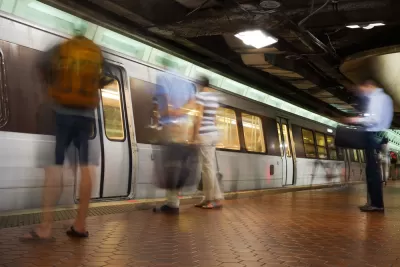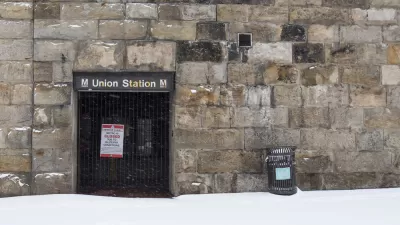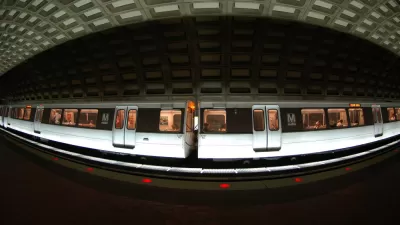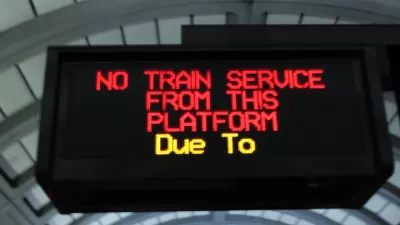Planning and urbanism writers in Washington, D.C. agree that a proposal to cut service to 20 stations in the Metrorail system would have harmful effects for minorities in the region.

"One cost-saving scenario Metro staff presented last week in discussions about how the agency might balance its budget includes closing 20 low-ridership stations during off-peak hours; Maryland and Virginia have seven stations each and six are in the District.
"Many of the stations are clustered on the eastern ends of the Silver, Blue, Orange and Green lines, in Prince George’s County and east of the Anacostia River in the District," adds Powers, before noting that all of these neighborhoods are home to communities of color.
Among the observers upset by the proposal was Metro board member Malcolm Augustine, who represents Prince George's. Powers describes Augustine as "livid" at the implications of the proposal.
Kriston Capps also noticed the troubling implications of the proposal in a post for CityLab, and added ridership figures to the evidence in the case against the proposal:
These stations may be Metro outliers for their lower ridership numbers. But throughout the system, mid-day ridership often rivals the morning or evening rush hours. (At no station does off-peak ridership beat both.) For stations east of the river, though, mid-day ridership accounts for a larger share of overall trips. Riders who use these stations, though relatively fewer in number, would be disproportionately inconvenienced by these specific service cuts.
Jonathan Neeley also analyzed the proposed service cuts, describing the proposal as draconian, harmful, and potentially harmful to Metro's already damaged reputation. In that post, Neeley also surveys the rest of Greater Greater Washington's writers for their opinion on the proposal, finding a chorus of consternation.
At least one potentially powerful federal regulation stands in the way of the proposed service cuts. The Powers article under discussion at the top of this post concludes with a reminder that Title VI of the Civil Rights Act requires "transit agencies enacting such significant changes in service [to] prepare an 'equity analysis.'"
FULL STORY: The 20 stations Metro could close during off-peak hours to save money are mostly in communities of color

Planetizen Federal Action Tracker
A weekly monitor of how Trump’s orders and actions are impacting planners and planning in America.

Congressman Proposes Bill to Rename DC Metro “Trump Train”
The Make Autorail Great Again Act would withhold federal funding to the system until the Washington Metropolitan Area Transit Authority (WMATA), rebrands as the Washington Metropolitan Authority for Greater Access (WMAGA).

The Simple Legislative Tool Transforming Vacant Downtowns
In California, Michigan and Georgia, an easy win is bringing dollars — and delight — back to city centers.

The States Losing Rural Delivery Rooms at an Alarming Pace
In some states, as few as 9% of rural hospitals still deliver babies. As a result, rising pre-term births, no adequate pre-term care and "harrowing" close calls are a growing reality.

The Small South Asian Republic Going all in on EVs
Thanks to one simple policy change less than five years ago, 65% of new cars in this Himalayan country are now electric.

DC Backpedals on Bike Lane Protection, Swaps Barriers for Paint
Citing aesthetic concerns, the city is removing the concrete barriers and flexposts that once separated Arizona Avenue cyclists from motor vehicles.
Urban Design for Planners 1: Software Tools
This six-course series explores essential urban design concepts using open source software and equips planners with the tools they need to participate fully in the urban design process.
Planning for Universal Design
Learn the tools for implementing Universal Design in planning regulations.
Smith Gee Studio
City of Charlotte
City of Camden Redevelopment Agency
City of Astoria
Transportation Research & Education Center (TREC) at Portland State University
US High Speed Rail Association
City of Camden Redevelopment Agency
Municipality of Princeton (NJ)





























